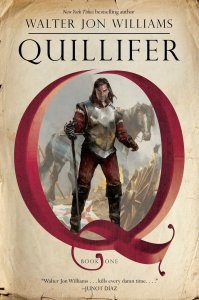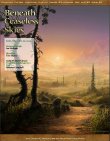Paul Di Filippo reviews Quillifer by Walter Jon Williams
Quillifer by Walter Jon Williams (Simon & Schuster/Saga Press 978-1-4814-8997-3, $27.99, 544pp, hardcover) October 2017
 Walter Jon Williams is one of those genre writers whose talents and ambitions are too large to be contained by any single mode of fantastika. He’s done space opera and near-future thrillers, high fantasy and steampunk, dystopias and cyberpunk. One never knows exactly what mode he will next attempt and conquer. His latest book does not fail to carry out this hopscotch pattern of literary jackdawism, nor does it fail to roundly entertain and amaze. In Quillifer, Williams has presented us with a picaresque novel in the grand tradition of Fielding’s Tom Jones, big as life and three times as amazing and affecting. When you add in its alluring setting of a wholly astonishing and palpable and organically believable subcreation, and some real magics that nevertheless do not dominate the zesty naturalism, then you might call it mannerpunk, in the fashion of Ellen Kushner or Caroline Stevermer (the last-named a voice that has gone regretably quiet of late). Yet perhaps the best comparison, given the narrator’s wryness and droll cynicism is James Branch Cabell. Does our hero Quillifer equal Jurgen? Or perhaps George MacDonald Fraser’s Flashman? Not quite, but they both are cousins to our man.
Walter Jon Williams is one of those genre writers whose talents and ambitions are too large to be contained by any single mode of fantastika. He’s done space opera and near-future thrillers, high fantasy and steampunk, dystopias and cyberpunk. One never knows exactly what mode he will next attempt and conquer. His latest book does not fail to carry out this hopscotch pattern of literary jackdawism, nor does it fail to roundly entertain and amaze. In Quillifer, Williams has presented us with a picaresque novel in the grand tradition of Fielding’s Tom Jones, big as life and three times as amazing and affecting. When you add in its alluring setting of a wholly astonishing and palpable and organically believable subcreation, and some real magics that nevertheless do not dominate the zesty naturalism, then you might call it mannerpunk, in the fashion of Ellen Kushner or Caroline Stevermer (the last-named a voice that has gone regretably quiet of late). Yet perhaps the best comparison, given the narrator’s wryness and droll cynicism is James Branch Cabell. Does our hero Quillifer equal Jurgen? Or perhaps George MacDonald Fraser’s Flashman? Not quite, but they both are cousins to our man.
We start with our young man, Quillifer, enjoying a happy life in the harbor town of Ethlebight. Not particularly handsome, he nonetheless is attractive and well-liked. He still lives at home with his Dad, who runs a well-respected butcher shop; his mum and his two sisters; and is half-heartedly apprenticed to a lawyer. But his live-at-home status does not preclude some sowing of wild oats, and indeed we encounter him first escaping a jealous husband. (Actually, there’s a prior framing device, recurring at intervals, by which Quillifer is relating his life’s adventures to an unknown companion. This device resolves nicely by book’s end.) Our lad proves himself daring and deft in this escapade, if not a tad self-serving and naive.
But all this youthful frippery is soon to come to a crashing close. Without spoiling Williams’s head-spinning turn of events, suffice it to say that Quillifer is soon outcast from his beloved town and on the road to seek his fortunes. He is swiftly taken up by some lesser royalty on a mission to the capitol city of Selford. His country is undergoing a monarchical transition to the reign of Queen Berlauda, but her half-brother Clayborne seems ready to contest the crown and plunge the country into civil war. But Quillifer’s embassy is quickly preempted by ransom-seeking bandits. And during his incarceration among the thieves, Quillifer meets a figure who will play a large part in all his future exploits.
Orlanda is one of the few surviving demiurges of the land, and she falls in love with Quillifer. But her attentions command too high a price, and so Quillifer spurns her as gently as possible. He goes free without seeming to incur a payback. But this is an illusion. Orlanda will intervene supernaturally in his life throughout the remaining pages, pages which are chockful of derring-do, blood and thunder, swashbuckling, and other good stuff evocative of Rafael Sabatini, Sir Walter Scott, and the penny-bloods: venomous and dangerous court politesse, reversals, betrayals, cowardice, heroism, illicit sex, allegorical theatrical productions, dangerous hunting expeditions, privateering and, at last, open warfare against the forces of Clayborne. During all of these excursions, Quillifer maintains his admirable sangfroid and cheek, never quite a full hero, but never a total antihero either. Despite Orlanda’s presence, it’s not precisely a tale of Swords and Sorcery. Rather, you might dub it Rogues and Rogering. Fritz Leiber or L. Sprague de Camp might have produced such a tale, as might have Michael Moorcock (I’m thinking of his Gloriana). But Williams plows his own ground brilliantly and seeds it with his unique fertile inventions.
Most charming is the language. Without using archaisms as plentifully as Gene Wolfe did in The Book of the New Sun, Williams still offers us antique and colorful ways of speaking which pop in lively fashion off the page. No one tenders an insult or a compliment, a threat or a promise, in bland modern-day form when they can embroider their speech with flowery locutions. Yet nothing is fusty or overdone. That’s another point of alignment with Cabell, as is Quillifer’s odyssey through ethical and utilitarian trials that enlighten him at severe cost and disabuse him of any preconceptions. Thickly plotted, this tale offers clever patterning of events along with a certain lifelike feeling of arbitrariness, seen in Quillifer’s sensation that he has been “blown from one course to another as if by a perverse wind.”
I had failed as a lawyer, a lover, and a courtier, and my success as a thief-taker had resulted only in my exile from the court. While the ship with my privateer commission had done well, on an actual voyage I was mere cargo, unable to contribute to the running of the ship or to victory in battle. And now I had been the victim of a feud with a nobleman that had brought a member of the royal family into personal danger. While I seemed to have avoided prison, I hardly thought my name was mentioned in the castle with any favor.
I had failed at everything.
Perhaps I was destined to rise no higher than the imaginary office of Groom of the Pudding.
So thinking, I drank myself into misery, and with aching bones and aching heart returned to my bed.
But by the book’s end, Quillifer has attained a certain precarious security and measure of fame. Yet his adventures are just beginning, and we bid a temporary farewell just as he is on the doorstep of a new kind of untried lifestyle. It does not take the prophesying powers of Orlanda to predict hilarious, frightening and scandalous events ahead in volume two.






Quillifer leaves the reader at its end anxiously searching the web to see if there is a sequel, a prequel, a short story, or any other form of Quillifer adventures to be had anywhere. Alas, one must await another day to discover what Williams has in store for his engaging not-quite-rogue Quillifer, and to learn how the young man’s fortunes fare under the dark threat that follows him wherever he goeth.